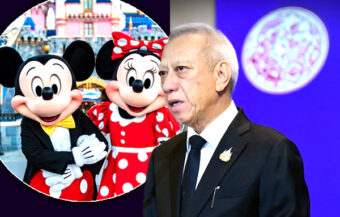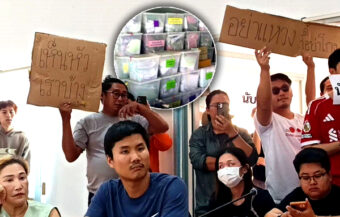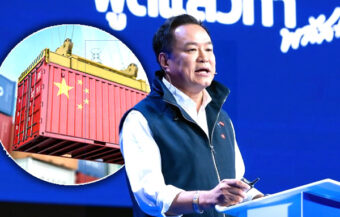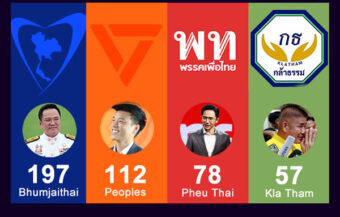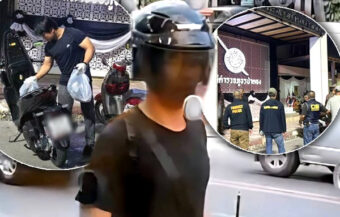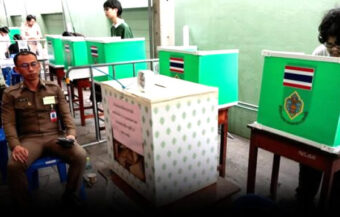PM Anutin confirms government plan for a referendum to cancel MOUs 43 and 44 with Cambodia. People’s Party MP Rome warns the move risks national security and legal battles while Pheu Thai’s Nattawut Saikuar warns it will ignite conservative nationalism ahead of the planned 2026 election in March or April.
People’s Party firebrand Rangsiman Rome slammed the government’s shock plan to hold a referendum alongside the 2026 election to cancel key border pacts with Cambodia. The move targets MOU 43 and 44—vital deals covering disputed land and energy-rich maritime zones. Rome called the plan reckless, warning it could spark international legal battles and threaten national security. Critics say it hands conservatives a powerful election weapon. Hours earlier, Prime Minister Anutin confirmed the vote and vowed a tougher stance on Cambodia.
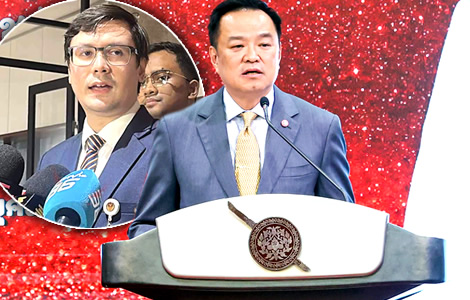
The Pheu Thai Party and the People’s Party are growing increasingly alarmed. Their concern stems from a surprise proposal tabled in parliament on Tuesday. Deputy Prime Minister Bowornsak Uwanno, the government’s new legal strongman, announced a plan for a national referendum.
His proposal would allow voters to revoke two long-standing Memorandums of Understanding—MOU 43 and MOU 44—signed with Cambodia. These agreements were originally established more than 20 years ago, under former Prime Minister Thaksin Shinawatra.
Importantly, MOU 43 pertains to border demarcation issues. MOU 44 addresses overlapping maritime claims in the Andaman Sea. This latter zone is believed to be rich in untapped oil and gas. Together, the MOUs have been critical to maintaining diplomatic calm between the two countries.
Referendum proposal shocks parliament as legal scholars warn of risks to border policy and oil reserves
On Tuesday, Bowornsak suggested the referendum could be scheduled for the upcoming General Election in early 2026. Immediately, the idea sparked outrage, calls for caution and confusion.
Former advisors to the Ministry of Foreign Affairs quickly sounded the alarm. They warned that cancelling the MOUs could destabilise long-term diplomacy. It might also hand Cambodia legal leverage to escalate disputes through international courts or arbitration panels.
Additionally, legal scholars note the agreements form the basis of Thailand’s current border policy. Removing them could trigger uncertainty over land and sea boundaries. Experts believe this could revive dormant tensions and reverse decades of progress.
Furthermore, the region covered by MOU 44 is not only geopolitically sensitive—it is economically strategic. Oil and gas reserves in the contested waters have long drawn interest from energy companies. Cancelling MOU 44 might spark lawsuits from firms already invested in the area.
Conservative bloc rallies behind plan while critics warn of ballot-box nationalism and legal backlash
Despite these risks, Bowornsak’s plan is gaining momentum. Conservative groups have long demanded the MOUs be scrapped. In fact, the Palang Pracharat Party, led by General Prawit Wongsuwan, has used the issue to galvanise nationalist support.
Now, with the Bhumjaithai Party in government, the threat of real action is rising. But not everyone is on board.
On Wednesday, former Pheu Thai advisor Nattawut Saikuar issued a public warning. He said placing such a sensitive issue on the ballot could inflame political tensions. Moreover, it might unite conservative voters in ways that disrupt any efforts to pass a constitutional reform proposal by referendum.
Nattawut also questioned whether any constitutional referendum would even pass parliamentary hurdles based on current trends, particularly from the Bhumjaithai Party-controlled Senate. If it did, however, he feared the political campaign would turn toxic. He warned of a populist surge that could damage Thailand’s long-term diplomatic credibility.
In parallel, the government’s tone toward Cambodia is becoming notably aggressive. On October 1, 2025, Prime Minister and Interior Minister Anutin Charnvirakul addressed the Royal Thai Police at their Bangkok headquarters. He offered a stark message on border security.
Thailand maintains full border readiness while cabinet accelerates funds for military operations
According to Anutin, Thai forces along the Cambodian frontier remain fully deployed. The military is coordinating with the Ministry of Foreign Affairs and top defence officials. These include the Commander-in-Chief and the Army’s Chief of Staff.
He stressed that all necessary resources would be made available. Furthermore, Anutin revealed that on September 30, the Cabinet had expedited approval of central funds to support border operations.
“The Army Commander-in-Chief assured me we are not at a disadvantage,” Anutin said. “We are upholding sovereignty and doing what we must.”
He added that if the MOUs are no longer beneficial to Thailand, his Cabinet stands ready to cancel them. “We are considering only Thailand’s interests,” he declared. “What they have done is not something we need to respect.”
Prime Minister stands firm as opposition MPs voice concerns over public referendum risks
Anutin made no effort to soften his stance. When asked about Cambodia’s response, he said bluntly: “We don’t care if our neighbours deceive. We know our capabilities. We know when to respond and how.”
Yet, not everyone in Parliament shares his confidence.
Later that day, MP Rangsiman Rome, of the People’s Party, gave a sharply worded statement. Speaking as chairman of the House Committee on State Security, Rangsiman admitted to being blindsided.
“I had no idea the government planned a referendum,” he told reporters at Parliament. “This matter is highly sensitive. Even our meetings are classified. Now they want the public to vote?”
He raised a key concern—how can voters be properly informed without revealing state secrets? Rangsiman fears that Cambodia could exploit public disclosures. If that happens, he warned, national security could be compromised.
MP Rome warns government secrecy and legal fallout could threaten Thailand’s national security and economy
Rangsiman also questioned the government’s motives. “Why did this come out of nowhere?” he asked. “Even MPs and Senators don’t have the full picture.”
He urged the press to demand answers directly from Prime Minister Anutin and the Bhumjaithai Party. Additionally, he warned of legal and diplomatic fallout. For example, if MOU 43 is cancelled, Cambodia might argue that the Joint Boundary Commission is defunct. That, in turn, could open the door to a case at the International Court of Justice.
Rangsiman also referenced the Kingsgate gold mine lawsuit as a cautionary tale. If MOU 44 is revoked, companies could claim damages for lost investments. Lawsuits would likely follow, he said, and Thailand might face compensation claims worth billions.
“These decisions are complex,” Rangsiman emphasised. “They require careful planning, not political theatre.”
Meanwhile, Foreign Minister Sihasak Phuangketkaew offered a more diplomatic tone. Speaking at 5:30 p.m. on Wednesday, October 1, Sihasak acknowledged the proposal had been discussed in advance. He confirmed the Foreign Ministry would support public participation, provided the public was well-informed.
Foreign Minister urges public education and transparency ahead of possible MOU referendum in 2026
Sihasak stressed that Thai citizens must fully understand what the MOUs entail. “These are serious agreements,” he said. “People must have access to facts before voting.”
He also addressed concerns about Cambodia’s role. Some legal scholars believe cancellation requires mutual consent. However, Sihasak stated the MOUs contain several exit mechanisms. He urged the public to review the documents carefully.
According to Sihasak, the next four months will be critical. The Ministry of Foreign Affairs is being tasked with more than immediate crisis management. It must also lay a long-term diplomatic foundation for Thailand’s future.
When asked whether relations with Cambodia can be restored, Sihasak was cautiously optimistic. “There must be sincerity,” he said. “Trust must be rebuilt slowly.”
But he also warned that false information could derail diplomacy. “Misinformation is dangerous,” Sihasak noted. “It can be intentional. We must control our message.”
Government insists peace and border stability must come first before any referendum or election debate
He ended with a reminder. The government’s first duty, he said, is to ensure peace and stability along the border. Only then can normal life resume for citizens in both countries.
Although the proposal to revoke the MOUs remains in the early stages, the political storm is already intensifying. With conservative forces on one side, and foreign policy experts on the other, the stage is set for a fierce national debate.
People’s Party firebrand MP warns of billions pouring into Thai markets and critical firms from Cambodia
Senate collusion raised by People’s Party MP who says he was intimidated as Commission probe progresses
Prime Minister Anutin’s policy statement on Monday mauled by Pheu Thai legal heavyweight Chusak Sirinil
Thailand now faces a choice between populist fervour and diplomatic caution. The clock is ticking toward 2026. But the question remains: will the public be voting on peace—or on peril?
Join the Thai News forum, follow Thai Examiner on Facebook here
Receive all our stories as they come out on Telegram here
Follow Thai Examiner here
Further reading:
Leader of deadly scam gang in Cambodia and henchmen still at large with 4 more Thais arrested
Police in Cambodia close in on fake scam loan app leadership after family murders in Samut Prakan
Cambodian cybercrime industry run by Chinese criminals could be generating up to 38% of its GDP
Debt and ฿1.7 million loss to scammers drive man to murder his wife and two sons in Samut Prakan
Loan shark arrested in Nonthaburi for bullying a borrower charged an annual interest rate of 730%
Bank of Thailand to tackle household debt in new plan from 2024 which will see higher standards
Politicians skating on thin ice as the economy may not be able to withstand a political stalemate
Debt crisis may be one of the top items on the new cabinet’s agenda as central bank stands ready
Potential hazard lights flashing as kingdom’s auto loans spiral into default with sky-high borrowing
Bank of Thailand governor gives veiled warning to voters on the danger posed by populist policies
Financial markets debt sell-off sending a signal to Thailand before the May 14th General Election
PM warns giveaway policies of some parties may be ‘bad karma’ for the country in the longer run
Economic recovery shaky despite strong foreign tourism as global economic outlook deteriorates









